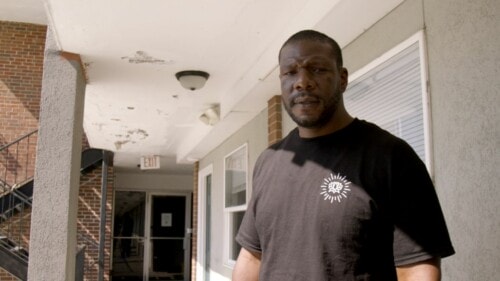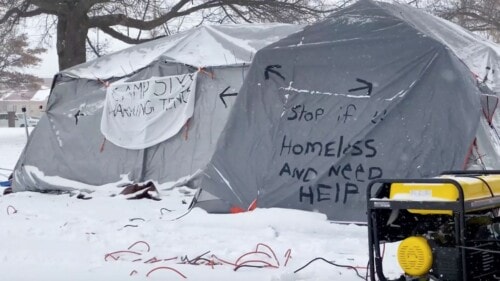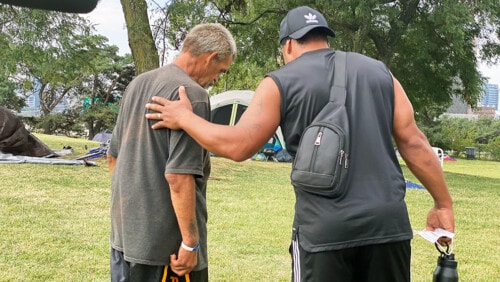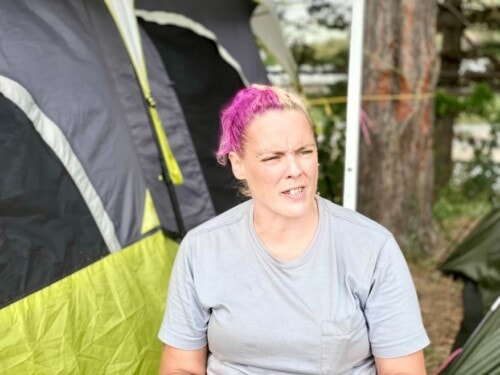Dilemma for the Houseless: ‘Where Do I Keep My Stuff?’ New KC Program Offers Personal Storage Bins
Published January 12th, 2022 at 6:00 AM
Above image credit: Plastic bins that Kansas City had available to begin a pilot program offering safe storage for houseless people. Fifty new, similar ones are arriving this week. (Courtesy | Downtown Council of Kansas City)All she really wants are the keepsakes.
She worries about family photos of her daughter as a girl and hand drawn artwork, like what other grandmothers tape to the refrigerator or place in a frame and hang.
But Michalene Kubas doesn’t have a wall, or a kitchen with appliances. She’s got a 2016 Nissan, which she’s been living in for several weeks.
“I can handle myself,” Kubas said. “But I get depressed.”
Her mementos, along with some clothes, are locked in a midtown storage space. Kubas lost the key to gain entry and can’t pay the overdue $200 in charges.
When you’re this close to sleeping on the streets, keeping the car running, as a place to stay warm while parked at night, takes priority. Kubas understands that her disability check, due to a diagnosed mental illness, must go toward maintaining the car, which is packed with her other belongings.
“I literally can’t find anything in it,” she said of the car. “The handprints of the grandbabies, that’s mostly why I bought the storage space.”
Storage space, somewhere to securely keep personal belongings, has long been an issue for houseless people.
The challenges are great for the houseless. They struggle with keeping items dry during rains and snow. They can’t safeguard much more than what can be carried in a backpack or strapped to a two-wheeled cart.
People who’ve recently lost housing, due to pandemic-related evictions and lost jobs, find themselves with more items than they can possibly carry. And it would be an extra expense for agencies trying to help them if all household items, pots, pans and furniture must be replaced.
But as Kubas can attest, it’s traumatic to lose treasured family mementos, items from before life turned so dire.
A solution is about to launch in Kansas City.
The city has donated about two dozen plastic bins – the royal blue receptacles many households use for recyclables.
Another 50 of the plastic bins are to arrive this week. Locks will be placed on each and they’ll be kept in a secure location near downtown agencies offering social service help.
The goal is to link the people with the need for storage with the other services – help getting identification papers, housing vouchers, mental health treatment and job training.
Austin, Texas, has a similar effort, called the Violet KeepSafe Storage program.
Wallace “Jay” James, human services coordinator with the Downtown KC Community Improvement Districts, researched the idea and will help oversee the program. A few of the bins have already been assigned to houseless people.

Plans have ramped up in the past few weeks, coming together quickly, as officials feared sweeps could occur with so many people camping in public park spaces.
A veteran with the U.S. Army, James first worked with other soldiers needing housing in Manhattan, Kansas.
But last winter, during Kansas City’s severe cold snap, he volunteered when the city opened up Bartle Hall to shelter people. Some nights more than 400 people gathered for warmth.
Most arrived carrying all of their personal belongings.
“The bigger issue is the lack of housing,” James said. “But imagine packing your house up every day and going across town.”
Theft is a big problem among those who live in camps, or elsewhere on the streets.
“For someone already experiencing trauma, that’s the last thing that they need to think about,” James said. “This can give someone a little piece of dignity.”
Living Off the Land
Intrigued, yet skeptical.
That’s how the idea of the bins was received by some of the houseless who gathered on Saturday, Jan. 8, for lunch at Cathedral of the Immaculate Conception.
The downtown church, referred to by many as the “gold dome” is well known among the houseless through its Morning Glory Ministries.
Among their questions:
- “Would there be a cost?” No. The city is paying for the bins and the program will be administered via the Community Improvement Districts of the Downtown Council of Kansas City.
- “When can we get our things?” Twice a week, on Tuesdays and Thursdays, during set hours.
- “Who has the key?” The client gets a key, but a master key would also be available. There also will be a system of photos to otherwise match people to their bins in case keys are lost.
One man, Bob, said that he’s lived outside for nearly a decade and knows how to keep his few belongings safe. He carries a backpack. The rest is being guarded, he said.
“If you know how to live off the land, you’ll be OK,” he said. “But I see people with two, three backpacks and a cart, trying to drag it all.”
John Kraus, director of the cathedral’s Morning Glory Ministries, sees the struggles daily that people endure to secure their belongings. Theft is a constant concern.

The Cathedral of the Immaculate Conception offers a wide range of services and will soon break ground on a new parish hall and a major renovation for the Morning Glory. But the program doesn’t have the space to store people’s items.
Some homeless people sleep during the day, then find a spot to hide their belongings and walk the city at night, Kraus said.
“It can be too dangerous to sleep on the streets at night,” he said.
But anywhere outside is dangerous when it’s frigid cold, including the steps of the cathedral.
Last week, Kraus found a woman, curled up hiding behind one of the planters at the entrance. She was clothed only in what looked like a nightgown. A coat, more a frozen piece of cloth, was nearby. When Kraus tried to pick up the coat, he saw the woman’s feet; blackened with severe frostbite.
He brought her inside, covered her with a comforter and called the police.
“It’s heart wrenching, the stories,” Kraus said. “She’s probably a double amputee now.”
Outreach with Dignity
For too long in Kansas City, people without a permanent home were forced to schlep their belongings from the east side of downtown to the western edges.
That was largely because the agencies that offered overnight shelter and other services were on the eastern edge. And services providing daily breakfast, lunch and dinner were on the western edge, said Sean O’Byrne, vice president of business development and executive director of Community Improvement Districts with the Downtown Council of Kansas City.
The bins are just one aspect of a renewed commitment to finding more comprehensive solutions for the houseless.
The city is taking a “housing first” approach. The Mayor’s Houseless Task Force has numerous initiatives, including a dashboard to track available shelter bed space, transitional housing and long-term efforts to address a lack of affordable housing in the city.
Increasing the city’s affordable housing stock can help stabilize families at risk of falling into homelessness. But there are many who aren’t ready to assume the responsibilities of living in an apartment or a home, even with voucher assistance, O’Byrne said.
Ramping up efforts to assist them is among the goals of the bin program.
More coordination between providers also is in the works, including using an app to track services as they are being provided, O’Byrne said.
An effort to approve a municipal identification will also launch in the spring, he said.
And NourishKC is remodeling its space in the lower level of the Downtown Community Services Center, which opened a dozen years ago at 750 Paseo Blvd.
Prior to the COVID pandemic, most grants to help the homeless didn’t offer much to deal with issues of storage, said Vickie L. Riddle, a consultant and formerly the executive director of the local Homeless Services Coalition.
Many area shelters offer space to store the backpacks that people often carry, but larger items can’t be kept, she said.
Now, with new populations of people being affected, the focus is on those who were lower middle class before the pandemic, but who are now struggling to afford a home, Riddle said. Those people have far more items to safeguard than those who more typically have been thought of as houseless.
“Storage is important,” Riddle said. “It’s important to understand how we approach all of these emerging issues. But like everything else, it’s not simple.”
For years, Riddle helped with the annual point-in-time count the third week in January. It’s a national effort intended to be a snapshot census and assessment of the nation’s homeless, an effort to track needs and emerging trends.
Kubas, the woman with the items in a storage shelter she can’t access, wasn’t among the approximately 1,500 people counted annually in recent years for Kansas City. She’s a more recent addition.
She admits that past drug use cost her the trust to be near her grandchildren.
Kraus, of the cathedral’s Morning Glory Ministries, helped her recently with a tire repair, a new battery and a full gas tank for her car.
For homeless people with cars, there’s a drill on cold nights. They turn the car on long enough to heat it up and charge a cell phone. Then they turn the car off and sleep, setting the alarm for a few hours. Wakeup. Repeat.
“I cover everything up with blankets,” Kubas said of sleeping in her car. “I don’t talk to anybody. And I stay by myself.”
Mary Sanchez is senior reporter for Kansas City PBS.







